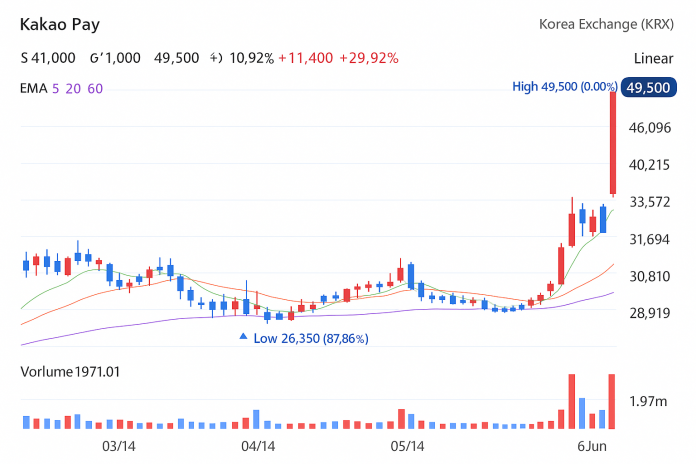
Kakao Pay shares skyrocketed on Monday, fueled by market expectations surrounding the Korean government’s push for stablecoin adoption. The stock surged nearly 30%, hitting the upper trading limit at ₩49,500, drawing intense attention from investors.
The rally was sparked by news that the new administration is accelerating efforts to institutionalize a Korean won-based stablecoin, signaling a shift in national payment infrastructure. Analysts expect fintech platforms like Kakao Pay to be among the key beneficiaries of this policy shift.
Unlike traditional cryptocurrencies, stablecoins maintain a fixed value by pegging to fiat currencies like the Korean won. This stability makes them highly suitable for everyday payments and cross-border transfers. Benefits such as lower fees, real-time settlement, and global scalability give them a significant edge over conventional card-based systems.
Kakao Pay is seen as the front-runner in leveraging this change. Already a dominant force in Korea’s mobile payments space, Kakao Pay is reportedly in talks to acquire SSG Pay and Smile Pay, which could further consolidate its position in the market.
An industry insider commented, “Kakao Pay operates as a comprehensive financial platform, spanning payments, remittances, insurance, and investments. If integrated with stablecoins, it could unlock new revenue models and transform overseas payment services—especially for tourists and expatriates.”
However, some caution that Korea’s legal and technical infrastructure for stablecoins is still in its early stages. Regulatory clarity and consumer protection mechanisms must evolve in parallel for full-scale implementation.
The government is expected to unveil a follow-up policy package to the Digital Asset Basic Act later this month, potentially outlining a regulatory framework for stablecoins and fostering collaboration with private fintech firms.
Beyond Kakao Pay, platforms like Toss and Naver Pay are also emerging as potential winners, signaling the beginning of a new era in payment platform competition in South Korea.






